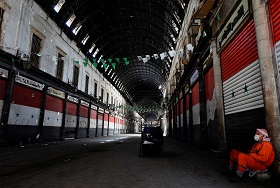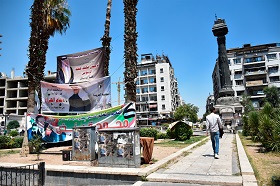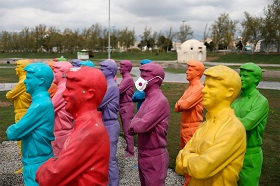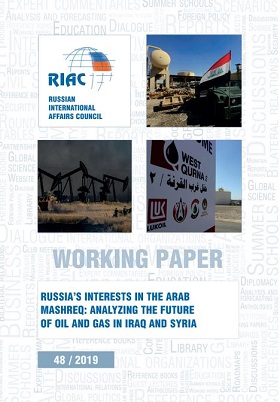On June 17, the United States began implementing the Caesar Act (the “Caesar Syria Civilian Protection Act”) following a six-month grace period that was granted to the administration so that it could prepare secondary sanctions against foreign citizens for cooperating with Damascus in oil, gas, aviation, defence and construction. The original sanctions list was made up of 39 Syrian individuals and legal entities, including Bashar al-Assad, his wife and his brother and sister. Paradoxically, however, not only do the new restrictive measures create difficulties, but they also form prerequisites for mobilizing Syria’s internal resources and expanding Russia’s economic presence in the country.
At first glance, Syria does not appear to be a coronavirus hot spot. The country has a population of over 16.4 million, yet the Ministry of Health has reported just 496 cases, 25 deaths and 144 recoveries as of July 17. Humanitarian NPOs reported the first case of COVID-19 in the mutinous city of Idlib on July 9 — it had been previously noted that the number of COVID-19 cases could have been greater by an order of magnitude due to the lack of quarantine measures. The Kurdish Self-Administration identified two more cases in northeast Syria back on April 28.
The high demand for U.S. dollars on the back of the devaluation of the Lebanese pound (the exchange rate had long sat at around LBP 1500 to the dollar, but has now fallen to LBP 2200 to the dollar) accelerated the depreciation of the Syrian currency. By mid-January 2020, the Syrian pound had dropped below the record figure of SYP 1000 to the dollar, while the pre-war exchange rate was SYP 47 to the dollar. The situation was also negatively affected by Turkish liras circulating in Idlib and northern regions that are formally controlled by the opposition’s “transitional government” formed with Ankara’s support.
In an attempt to keep control of the situation, on January 18, Bashar al-Assad issued Order 2/2020, introducing harsher punishment for illegal transactions in foreign currencies. In February, the government capped currency imports at USD 100,000, with currency in excess of USD 5000 subject to declaration. Currency exports by Syrian citizens were capped at USD 10,000. The government took the unprecedented step of allowing a private company to put an e-currency (lira) into circulation starting on January 1, 2020, which was to be tied to domestic accounts nominated in Syrian pounds, but it could be used abroad as an alternative to the dollar in order to finance imports. The idea was that it would stimulate demand for Syrian pounds since participants in such transactions would buy them in order to exchange them for liras.
Much will depend on the stance that Europe takes on the Caesar Act, and this is a complicated matter. In May, Brussels once again extended its sanctions against Syria for another year. On the other hand, Europe is debating adjusting its approaches to the Syrian reconstruction effort. The German expert Muriel Asseburg notes that the European Union’s consolidated standing is eroded by differences between the United Kingdom, Germany and France on the one hand, as they favour preserving the hard-line approach, and Austria, Hungary, Italy and Poland on the other, as they are ready to expand their economic presence in “al-Assad’s Syria.” The proposal is to become involved in the reconstruction effort in the areas controlled by the authorities, thus raising living standards under the slogan of “sustainable stabilization” and refraining from completely normalizing relations with Damascus.
To sum up, even though the Caesar Act is a challenge for Syria and its allies, there is real potential there for neutralizing its consequences through the mobilization of Syria’s internal reserves and strengthening economic cooperation with Russia.
On June 17, the United States began implementing the Caesar Act (the “Caesar Syria Civilian Protection Act”) following a six-month grace period that was granted to the administration so that it could prepare secondary sanctions against foreign citizens for cooperating with Damascus in oil, gas, aviation, defence and construction. The original sanctions list was made up of 39 Syrian individuals and legal entities, including Bashar al-Assad, his wife and his brother and sister. Paradoxically, however, not only do the new restrictive measures create difficulties, but they also form prerequisites for mobilizing Syria’s internal resources and expanding Russia’s economic presence in the country.
Factors Aggravating the Socioeconomic Situation in Syria
The COVID-19 Pandemic
At first glance, Syria does not appear to be a coronavirus hot spot. The country has a population of over 16.4 million, yet the Ministry of Health has reported just 496 cases, 25 deaths and 144 recoveries as of July 17. Humanitarian NPOs reported the first case of COVID-19 in the mutinous city of Idlib on July 9 — it had been previously noted that the number of COVID-19 cases could have been greater by an order of magnitude due to the lack of quarantine measures. The Kurdish Self-Administration identified two more cases in northeast Syria back on April 28.
Initially, Syrian experts thought that the country’s marginalization in the global economy would make it less vulnerable to the pandemic. The authorities established a governmental headquarters and deployed a standard set of measures to combat the infection: borders were closed, air travel was suspended, people arriving in the country from abroad had to quarantine, a curfew was introduced, travel between governorates was restricted, public events were banned, and schools, universities, markets and restaurants were closed. The elections to the People’s Council (Parliament) were rescheduled for July 19, 2020. In order to support the population and businesses, the Ministry of Labour launched the “National Campaign for Social Emergency Response,” while the Ministry of Tourism approved a plan for supporting the tourism industry. The government abolished the 40-per cent import deposits and allowed private enterprises to import flour. Sugar, rice, tea and fuel were distributed at subsidized prices under the “smart card” programme. In late May, the government followed the example of other countries around the world, started to relax the protective measures: the curfew was abolished and government agencies resumed their regular operations.
However, it should be noted that, according to the German Institute for International and Security Affairs, the conflict in Syria meant that the country was poorly prepared to handle the pandemic. The lack of consensus among foreign actors on how to provide aid to Syria did not help — the country’s additional needs totalled USD 385 million, according to the May 7 briefing of UN Spokesperson Stéphane Dujarric. Damascus had to be content with donor deliveries from China, India and Russia. The sanctions took away the competitive edge of the local products due to high prices on energy, diesel fuel and gas and the shortage of raw materials and skilled labour, which played into the hands of commercial monopolies.
The pandemic nullified the government’s effort to present the reconstruction effort as a “prize” for investors, since all exhibitions, including the 62nd Damascus International Fair, were rescheduled for 2021 (despite Washington’s warnings, 38 countries participated in the 61st Fair, including business delegations from the United Arab Emirates and Oman). The coronavirus paralyzed trade with Iraq through the Abu Kamal — Qaim border checkpoint that was opened on September 30, 2019, and on which both parties had pinned great hopes.
The falling living standards produced an upsurge in protests: in January and June 2020, the Druze population in the relatively calm southern governorate of As-Suwayda held rallies demanding the resignation of Bashar al-Assad. To defuse social tensions, the President dismissed the unpopular Prime Minister Imad Khamis, who had been in office since 2016.
The Lebanese Crisis
The crisis in neighbouring Lebanon, which was particularly acute in October–November 2019 and April 2020, had a far greater effect on Syria’s economic situation than the pandemic. By early 2020, Syrian deposits in Lebanese banks had reached USD 40–50 billion — a quarter of all deposits. Tighter control over cash withdrawals and banking transactions made it harder to transfer assets out of banks and diminished the effectiveness of the Intervention Fund for Supporting the Syrian pound established by the Syrian government. Wire transfers from Syrian diasporas abroad also dropped, which impacted the state’s foreign currency revenues and narrowed the domestic investment base. Syria’s total net wealth (USD 21.1 billion as of June 2019, according to Credit Swiss) is still many times less than Lebanon’s (USD 232.2 billion), not to mention that of Saudi Arabia (USD 1.56 trillion, making it the richest country in the Arab world).
The Caesar Act immediately delivered a blow to the banking cooperation between Damascus and Beirut, as Lebanon’s CSCGroup stopped servicing Syrian ATMs. On June 23, Minister of Foreign Affairs of Syria Walid Muallem spoke about coordinating efforts to prevent secondary American sanctions, but never received a clear response from Lebanon.
Devaluation of the Syrian Currency
The high demand for U.S. dollars on the back of the devaluation of the Lebanese pound (the exchange rate had long sat at around LBP 1500 to the dollar, but has now fallen to LBP 2200 to the dollar) accelerated the depreciation of the Syrian currency. By mid-January 2020, the Syrian pound had dropped below the record figure of SYP 1000 to the dollar, while the pre-war exchange rate was SYP 47 to the dollar. The situation was also negatively affected by Turkish liras circulating in Idlib and northern regions that are formally controlled by the opposition’s “transitional government” formed with Ankara’s support.
In an attempt to keep control of the situation, on January 18, Bashar al-Assad issued Order 2/2020, introducing harsher punishment for illegal transactions in foreign currencies. In February, the government capped currency imports at USD 100,000, with currency in excess of USD 5000 subject to declaration. Currency exports by Syrian citizens were capped at USD 10,000. The government took the unprecedented step of allowing a private company to put an e-currency (lira) into circulation starting on January 1, 2020, which was to be tied to domestic accounts nominated in Syrian pounds, but it could be used abroad as an alternative to the dollar in order to finance imports. The idea was that it would stimulate demand for Syrian pounds since participants in such transactions would buy them in order to exchange them for liras.
The Fragmentation of Syrian Territory
Thus far, Bashar al-Assad has failed to keep his promise to “liberate every inch of the Syrian land.” Approximately 40 per cent of the country, including Idlib, the north, and the trans-Euphrates territory is not under Damascus’ control. The lawyers at the Syrian Law Journal website hit the nail on the head when they noted that the Caesar Act is intended primarily to isolate government-controlled regions, which will inevitably result in the growth of “shadow” commerce. In October 2017, Herbert McMaster summed up the gist of the American approaches, “We should ensure that not a dollar […] goes to reconstruct anything that is under the control of this brutal [Syrian] regime.”
Discord in Syria’s Top Echelons
The economic crisis was compounded by Bashar al-Assad’s cousin Rami Makhlouf, the most prominent of the “state bourgeois” whom Syrians nicknamed the “children of the power” (Awlad alsulta), falling out of favour. Last year, he was rumoured to have been placed under house arrest for his refusal to donate the bulk of his 5-billion-dollar fortune to advance the Syrian President’s personal efforts to involve the private sector in the reconstruction of the country. Foreign commenters put forward an ambiguous version claiming that Makhlouf had a complicated relationship with Bashar al-Assad’s wife Asma, who was planning to create, together with Samer Foz, another “child of the power,” Syria’s third cellular service provider to compete with Syriatel, the flagship of Makhlouf’s “empire.”
The Caesar Act as an Aggravating Factor
While the Department of State insists that secondary sanctions do not extend to the humanitarian sphere, they cannot but have an effect on regular Syrians, since they aggravate the economic crisis in the country. This is an apt place to quote Deputy Minister of Foreign Affairs of the Russian Federation Sergey Vershinin who said at the IV Brussels Conference on Supporting the Future of Syria and the Region on June 30, 2020, that the Caesar Act ignores UN Secretary-General Antonio Guterres’s call to suspend restrictions in the face of the global coronavirus pandemic.
Along with its destructive influence on the situation inside Syria, the Caesar Act is clearly intended to scare away those who may want to invest in the country’s reconstruction efforts. This applies primarily to Washington’s Arab allies, even against the backdrop of positive signals sent to Damascus, such as the telephone conversation between Crown Prince of the Emirate of Abu Dhabi Mohammed bin Zayed Al Nahyan and Bashar al-Assad, when the parties discussed aid to Syria in combating the COVID-19.
The Caesar Act and Russia’s Economic Presence in Syria
Nothing Good Can Come of it for Moscow?
Despite the obvious obstacles that the Caesar Acts creates for Russian companies, the are a number of examples where the reverse is true in terms of Syria leaning more and more towards Russia economically. Russian business has experience in dividing up the roles with Iran, the leading economic player in Syria. For instance, the global media took notice of the agreement to jointly develop the phosphate fields in Palmyra, which was liberated from ISIL by pro-Iranian units.
New sanctions will most likely postpone China’s involvement in the reconstruction effort, since China was already somewhat cautious, confining itself to humanitarian aid on a rather modest scale by Chinese standards (on March 4, an agreement was signed for Beijing to provide a 14-million-dollar grant). Lebanon’s domestic crisis rendered the possibility of non-sanctioned Lebanon acting as an intermediary, suggesting that China invest in the Tripoli port in order to transform it into a “hub” for entry into Syria, moot.
The potential of Abkhazia and Crimea, which have already been hit by sanctions, to act as intermediaries is objectively increasing. For instance, the Agreement between the Council of Ministers of the Republic of Crimea and the Ministry of Economy and Foreign Trade of the Syrian Arab Republic on Trade and Economic Cooperation as part of plans to create a joint trading house to export grain and industrial products to Syria with payments to be made in roubles, and the Agreement on Cooperation between the Government of the Republic of Abkhazia and the Government of the Syrian Arab Republic in the Field of Trade Promotion and Economic Cooperation may be injected with specific substance.
The Caesar Act may prompt Syrian IT sector operators to choose Russian analogues or unique technologies instead of the American software they previously used, thus bypassing the sanctions, or instead of cooperating with India. The first sign that this may be the case was the launch of the Electronic Signature Certification Centre with the assistance of RusinformExport LLC in September 2019.
Russia’s Economic Strategies in Syria
There are two emerging approaches concerning Russia’s participation in Syria’s post-war reconstruction effort. The “broad” concept entails involving large- and medium-sized business with financial and administrative governmental support and under the auspices of the Permanent Russian–Syrian Commission on Trade, Economic, Scientific, and Technical Cooperation (which held its 12th in Moscow meeting on December 23–25, 2019). The Commission prioritizes energy, transportation and the IT sector.
The “narrow” strategy entails putting the “Syrian dossier” within the purview of a very narrow circle of entrepreneurs who have experience of working in Syria in peacetime and wartime, such as Gennady Timchenko’s Stroytransgaz JSC (STG), which assisted in the construction of two gas-processing plants and now focuses on ensuring the end-to-end cycle of producing, processing and exporting phosphates. STG’s bodies have leased the Syrian port of Tartus for 49 years as a result.
Given the appearance of the Caesar Act, it would appear that Moscow will choose the “narrow” option in order to avoid secondary sanctions being imposed on Russian businesses, many of which work in Europe and with the member states of the Cooperation Council for the Arab States of the Gulf. Companies such as STG are used to operating under sanctions and dealing with security issues. They have a “financial security margin” for investing and wealthy local partners. They could help recoup the money spent on the military operation in Syria by mining valuable minerals on exclusive terms.
Russia’s Prospective Role in Restoring Economic Ties
Moscow is prepared to act as an intermediary in implementing projects throughout Syria by using summit-level dialogue with Turkey, connections in Kurdish business circles, and the presence of the Military Police of Russia in Syria’s northern regions and other parts of the country. It should be remembered that Recep Tayyip Erdogan proposed that Turkey, Russia and the United States jointly manage oil fields in the Deir-ez-Zor Governorate, which he believes would benefit all the parties to the conflict, including the Syrian authorities, the opposition’s “transitional government” and the Syrian Democratic Forces.
Possible Responses of Damascus to the Caesar Act
Complicated Relations with Iran and Russia
It is no secret that Damascus has to manoeuvre between Moscow and Tehran, as they pursue different interests. Iran banks on proxy militias as it advances its influence “beyond the Syrian state” as part of its anti-Israel “Shia Crescent” project. These actions open up the Syrians to U.S. sanctions and make them a target of Israel’s surgical strikes. They also allow Tehran to claim a special role in the reconstruction effort, which, once again, prompts a harsher retaliation from the United States. Russia, on the contrary, is interested in bolstering the official institutions of “al-Assad’s Syria” which, by ousting non-state actors, would monitor business projects, primarily those related to valuable minerals.
If there is a shortage of commercially profitable projects, we cannot rule out the possibility of Russia rigidly protecting its interests by keeping Damascus from escalating the conflict and getting too friendly with Iran. Western media reported some backstage agreements between Syria and the United Arab Emirates that entail Syria continuing the operation in Idlib in exchange for “financial compensation” and in contravention of Russia–Turkey arrangements. It was against this backdrop that the Russian media ran stories of Moscow’s discontent with Bashar al-Assad this past May.
Paying for Russian and Iranian Aid with Valuable Minerals
Heeding the imperative to provide its main allies with access to its mineral resources, the People’s Council of Syria ratified three oil field development agreements in December 2019, just as Donald Trump was signing the Caesar Act. These agreements were concluded between the Ministry of Petroleum and Mineral Resources and Mercury Limited (units and 19) and Velada (unit 23). Since little is known about these companies, it was speculated that they are a front for an entrepreneur with ties to the Kremlin. In an attempt to maintain a balance between Moscow and Tehran, the Syrian parliament opened discussions in May on giving unit 12 near Abu Kamal to the Iranians as partial repayment of loans received from Iran in 2013–2019. A new military agreement with Iran was signed in Damascus on July 8, 2020. Adviser to the President of Syria Bouthaina Shaaban called it the first step to defeating the Caesar Act.
The Syrian Government’s Dialogue with Kurds
Despite the fact that the Syrian government does not recognize the Autonomous Administration of North and East Syria, it did not interrupt its commercial and economic contacts with the Kurds. In June, the government approved an increase in the purchase price of wheat from SYP 225 to SYP 400 per kilogram, as opposed to SYP 315 per kilogram paid by the local authorities, in order to purchase maximum amounts of wheat in Jazira (in the north-eastern Al-Hasakah Governorate) known as Syria’s “grain stores.” This showed that Damascus was ready to restore economic ties before the political settlement of the Kurdish problem had been achieved.
The EU’s Stance on the Caesar Act
Much will depend on the stance that Europe takes on the Caesar Act, and this is a complicated matter. In May, Brussels once again extended its sanctions against Syria for another year. On the other hand, Europe is debating adjusting its approaches to the Syrian reconstruction effort. The German expert Muriel Asseburg notes that the European Union’s consolidated standing is eroded by differences between the United Kingdom, Germany and France on the one hand, as they favour preserving the hard-line approach, and Austria, Hungary, Italy and Poland on the other, as they are ready to expand their economic presence in “al-Assad’s Syria.” The proposal is to become involved in the reconstruction effort in the areas controlled by the authorities, thus raising living standards under the slogan of “sustainable stabilization” and refraining from completely normalizing relations with Damascus.
To sum up, even though the Caesar Act is a challenge for Syria and its allies, there is real potential there for neutralizing its consequences through the mobilization of Syria’s internal reserves and strengthening economic cooperation with Russia.









